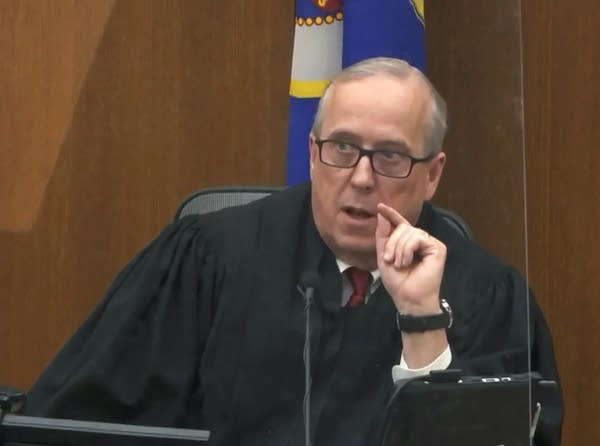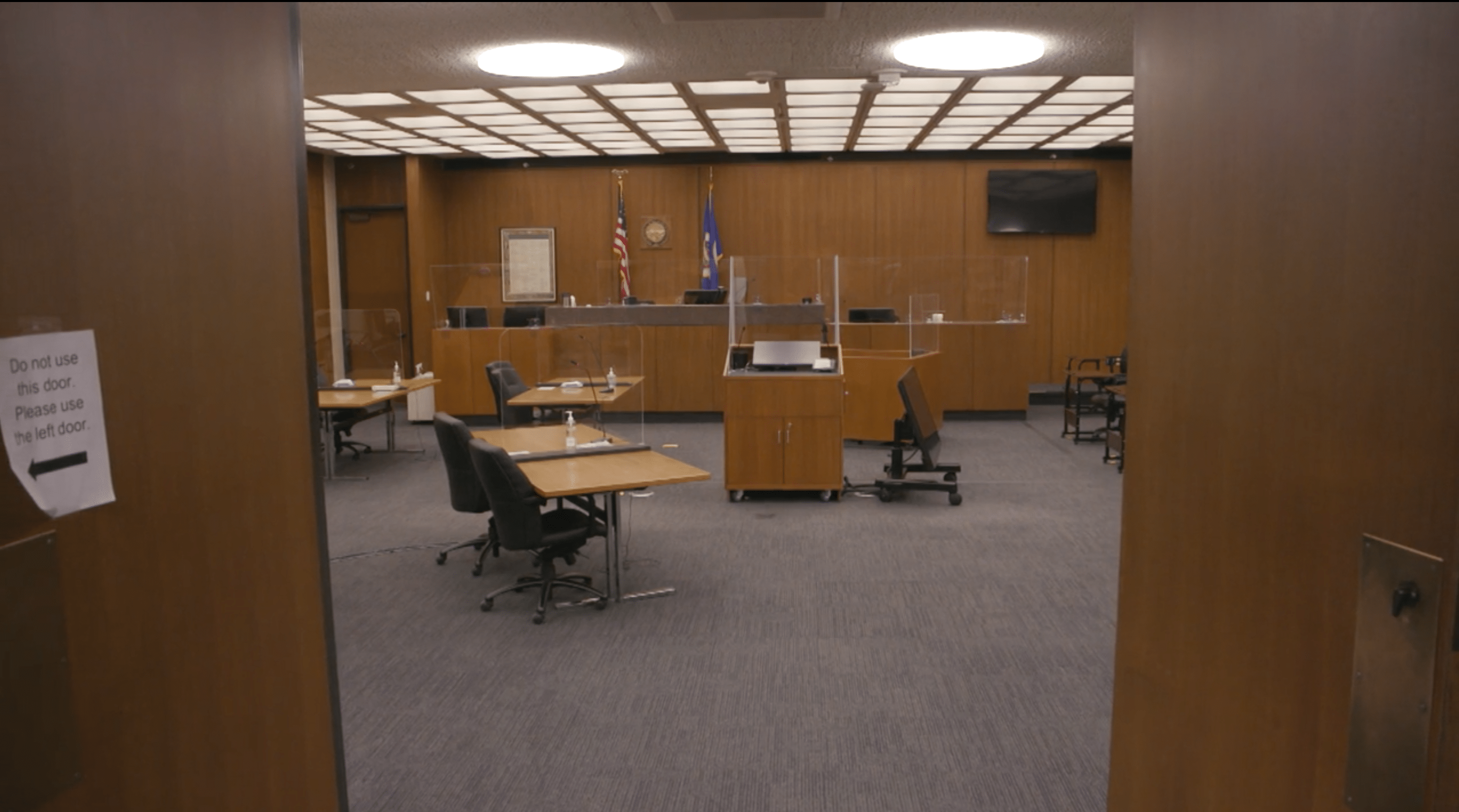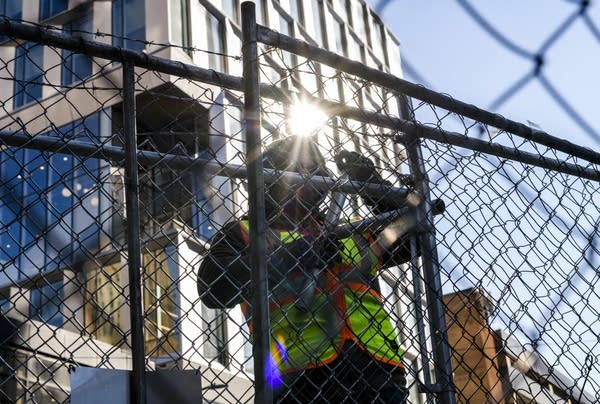Chauvin trial: Judge weighs delay as Floyd family settlement roils case
Tuesday proceedings have ended

Go Deeper.
Create an account or log in to save stories.
Like this?
Thanks for liking this story! We have added it to a list of your favorite stories.
MPR News will stream live coverage of the trial on Facebook beginning at 8 a.m. Some images or material discussed during the trial will be disturbing to many viewers. Watch the morning proceedings here. Watch the afternoon proceedings here:
3 things to know:
Chauvin's attorney wants trial delayed, worried news of a $27 million civil settlement with George Floyd’s family will taint jury selection; Judge Peter Cahill considering
Cahill plans to talk Wednesday with jurors who’ve been picked to ask what they know about the settlement
Judge denies defense request to sequester the jury for the entire trial, although jurors will be sequestered during deliberations
Updated: 5:40 p.m.
Prosecutors pushed back Tuesday on defense arguments that a $27 million settlement between Minneapolis and the George Floyd family may taint the process to pick a jury in Derek Chauvin’s criminal trial.
Concerns that the settlement news will taint a prospective jury are overblown and only three of 14 potential jurors interviewed this week had heard of it, prosecutor Steve Schleicher told the court.
Hennepin County Judge Peter Cahill seemed to agree, saying earlier news of a scuttled plea deal for Chauvin is more problematic for a fair trial than news of the Floyd family settling the wrongful death civil suit.
Turn Up Your Support
MPR News helps you turn down the noise and build shared understanding. Turn up your support for this public resource and keep trusted journalism accessible to all.
Cahill said he planned to interview seven of the nine jurors selected so far via video conference on Wednesday to question them briefly on the matter. The judge is expected to rule this week on defense motions seeking to move or delay the trial.
The court heard from seven prospective jurors on Tuesday without seating any of them. In total, nine jurors have been seated, and five more are needed.
Chauvin, an ex-Minneapolis police officer, faces charges of second-degree unintentional murder, third-degree murder and second-degree manslaughter in Floyd’s killing last year while in police custody. Opening statements in the trial are expected March 29.
Earlier in the day, Schleicher said it would be impossible to divine how the the settlement news would tilt jurors’ opinions.
“I wish city officials would stop talking about this case so much,” Cahill said, “but at the same time, I don’t find any evil intent that they are trying to tamper with this criminal case.”

Cahill also took issue with a Washington Post article that reported that a city source said the district court’s chief judge, Toddrick Barnette, gave the city the go-ahead to make the announcement.
Cahill said the court has no authority to tell the city what to do. “I think the city is trying to dump their responsibility back on the court where it does not belong.”
Tuesday began with the defense arguing to include evidence from a May 6, 2019 arrest of George Floyd. Attorney Eric Nelson said parts of that encounter and the fatal May 25, 2020 incident are “remarkably similar.”
Prosecutors pushed back, saying that evidence is prejudicial and said the move was an act of desperation by the defense.
Cahill said he would discuss the 2019 arrest issue on Wednesday after reviewing more evidence and make a decision Thursday.
‘Almost sick to my stomach’
Cahill is protecting the identities of people in the jury pool. There are cameras in the courtroom, but they are not allowed to show the potential jurors, who are identified only by number, not name.
The court, though, has collected information self-reported by the jurors. The seven seated last week include a Hispanic man; a Black man who is an immigrant; a woman who identifies as multiracial; three white men and one white woman.
Two more jurors were chosen Monday despite the concerns generated by the payout. Cahill’s court has so far seated nine of the 12 jurors and two alternates needed for Chauvin’s trial.
The eighth juror, a Black man in his 30s, was chosen midmorning Monday. He said he’d seen headlines about the trial since he received his jury summons but had not seen any news about the pretrial settlement. He said he works in the banking industry and is a youth sports coach.
The juror was asked about his views about police officers and if he’s ever seen them use more force than was needed.
Nelson read back one of the man’s written responses.
“You wrote, ‘In downtown Minneapolis I’ve seen police body slam and then Mace an individual simply because they did not obey an order quick enough,’ ” read Nelson.
The man said he didn’t see the whole altercation because he was just passing by.
The man also elaborated on an answer he gave about discrimination and whether he thinks the media makes it out to be worse than it actually is. He said discrimination is very prevalent.
“It’s well beyond what the media can even report,” he said. “Discrimination is such a broad spectrum of things. It would just be impossible for the media to cover it all. Some of the smallest things could be discrimination.”
On Monday, the judge asked one potential juror, a teacher whose work involves diversity and inclusion, if he could be impartial.
“No,” the man replied. “I'm almost sick to my stomach right now.” He said he wouldn't be able to face colleagues and students after serving on the jury, no matter the verdict. He was excused from the pool.

The ninth juror chosen is a white woman in her 50s who described herself as a single mother of two working in health care as an executive assistant. She said she couldn’t watch the full video of Floyd handcuffed and face down on the ground with Chauvin’s knee pressed into Floyd’s neck because she found it too disturbing.
She also said in her questionnaire she has a somewhat negative opinion of Chauvin but that he’s innocent until proven otherwise. She said she has a somewhat unfavorable opinion of Black Lives Matter.
Trial basics

Who’s who: A look at the key players in the trial.
Need to know: 14 key questions about the trial, answered.
Jury selection: The complex process to pick jurors who will weigh charges fairly.
MPR News on its coverage: Ahead of Chauvin’s trial, Nancy Lebens, the newsroom’s deputy managing editor, answered audience questions about our reporting plans.
George Floyd and his legacy

Remembering George Floyd, the man: Before he became a symbol in the fight for racial justice, friends say Floyd was a “gentle giant” who sought a fresh start.
Making George Floyd Square: Here’s how the site of Floyd’s killing — 38th Street and Chicago Avenue in Minneapolis — is being reshaped.
Calls for change: Here’s what some Floyd activists tell MPR News about their experiences with race in Minnesota, why they march and what they hope for the future.
Read more

Who belongs on Chauvin's jury? Three community members discuss how jury selection does or doesn’t work — and how it should work. (Sahan Journal)
What is the impact of racially diverse juries? Scholars, courts and legal groups have increasingly advocated for greater jury diversity — not just of race, but of gender and socioeconomic backgrounds — as a way to make trials fairer. (The Associated Press)
Minneapolis council OKs $27M Floyd family settlement: It’s a record settlement amount for the city.
Your questions about the Chauvin trial, answered: Why are potential jurors asked about religion, who can dismiss them and why can the jury hear about Derek Chauvin’s past but not George Floyd’s?
Activist and Christian hip-hop artist remembers his friend, George Floyd: NPR's Ari Shapiro speaks with Ronnie Lillard as the trial of former officer Derek Chauvin continues. (NPR)
Possibility of an unpopular verdict makes some in jury pool nervous: Several people have said they fear retribution if they were to render an unpopular verdict. (NPR)




